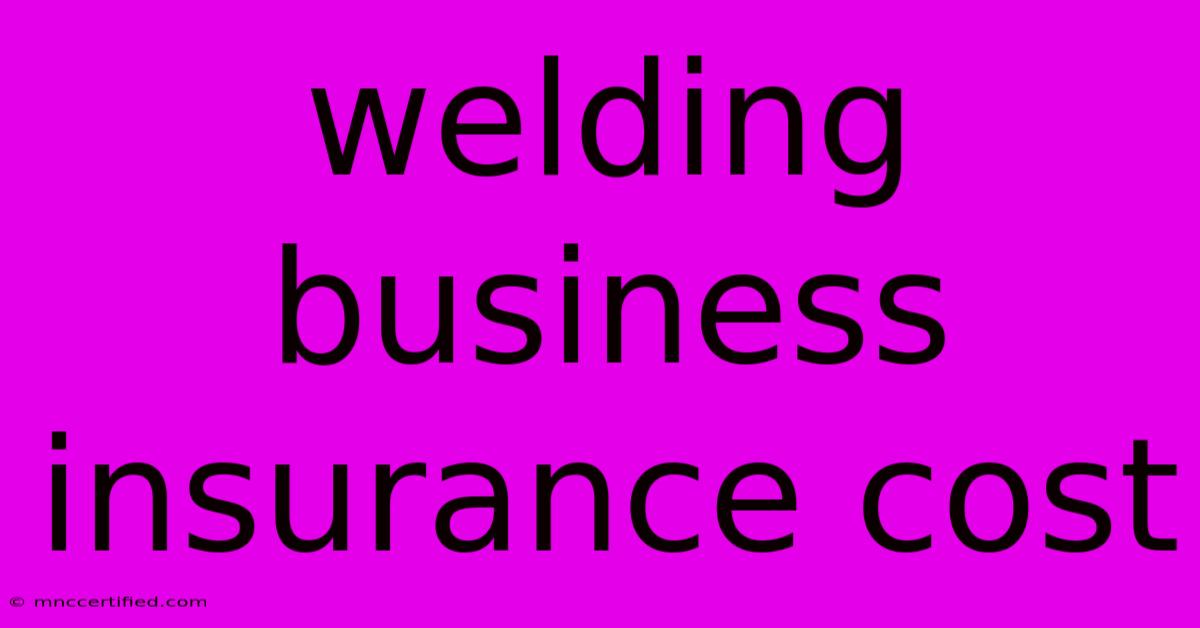Welding Business Insurance Cost

Table of Contents
Welding Business Insurance Cost: A Comprehensive Guide
Starting a welding business is exciting, but protecting it requires careful planning, especially when it comes to insurance. Understanding the costs associated with welding business insurance is crucial for budgeting and ensuring your operation's longevity. This comprehensive guide breaks down the various types of insurance you'll need, influencing factors on cost, and tips for securing the best coverage at a competitive price.
Types of Welding Business Insurance
Several types of insurance are essential for a welding business, each addressing different risks:
1. General Liability Insurance: The Foundation
This is the cornerstone of any business insurance policy. General liability insurance protects your business from financial losses resulting from bodily injury or property damage caused by your operations or employees. For example, if a client is injured on your premises or their property is damaged due to your negligence, general liability insurance covers the costs of medical bills, legal fees, and settlements. The cost of general liability insurance for welding businesses varies but typically ranges from $500 to $1500 annually, depending on factors discussed below.
2. Commercial Auto Insurance: Protecting Your Vehicles
If you use vehicles for business purposes – transporting equipment, visiting clients, etc. – you need commercial auto insurance. This goes beyond personal auto insurance and provides coverage for accidents and damages involving your business vehicles. Costs depend on factors like the type of vehicle, your driving record, and the coverage levels you choose. Expect to pay anywhere from $1000 to $5000 annually, or more, depending on your specific needs and location.
3. Workers' Compensation Insurance: Protecting Your Employees
If you employ welders, workers' compensation insurance is mandatory in most states. This insurance covers medical expenses and lost wages for employees injured on the job. Failure to carry workers' compensation insurance can result in significant penalties. The cost varies greatly depending on your state, the number of employees, your industry classification (welding is considered a higher-risk profession), and your claims history. Costs can range from a few hundred dollars to several thousand dollars annually per employee.
4. Equipment Insurance: Protecting Your Investments
Welding equipment is expensive. Equipment insurance protects your valuable tools and machinery from damage, theft, or loss due to fire, accidents, or natural disasters. This is crucial for mitigating financial setbacks if your equipment is damaged or destroyed. Costs vary depending on the value of your equipment and the level of coverage you choose.
5. Commercial Umbrella Insurance: An Added Layer of Protection
A commercial umbrella policy provides additional liability coverage beyond your general liability and other policies. It offers a crucial safety net in case of a significant lawsuit or claim that exceeds your primary policy limits. While optional, it's a worthwhile investment for larger welding businesses or those facing higher liability risks. Costs depend on your underlying liability coverage and the umbrella limit you choose.
Factors Affecting Welding Business Insurance Cost
Several factors influence the cost of your welding business insurance:
- Location: Insurance premiums vary by state and even by region within a state due to differences in claim frequency and severity.
- Business Size: Larger businesses with more employees and higher revenue generally pay more for insurance.
- Industry Classification: Welding is considered a higher-risk industry due to the potential for burns, fires, and other injuries. This classification directly impacts your premiums.
- Claims History: A history of claims can significantly increase your insurance premiums.
- Safety Measures: Implementing robust safety protocols and providing employee safety training can lower your premiums. Insurers reward businesses demonstrating a commitment to safety.
- Coverage Limits: Higher coverage limits result in higher premiums. You need to find a balance between adequate protection and affordability.
- Deductible: Choosing a higher deductible will lower your premium, but you'll pay more out-of-pocket in case of a claim.
Tips for Reducing Welding Business Insurance Costs
- Shop Around: Get quotes from multiple insurance providers to compare prices and coverage options.
- Bundle Policies: Bundling your general liability, commercial auto, and workers' compensation insurance with the same provider can often result in discounts.
- Improve Safety: Implement strong safety procedures and invest in safety training for your employees. This reduces your risk profile and can lead to lower premiums.
- Maintain Accurate Records: Keeping meticulous records of your business operations and safety measures can help demonstrate your commitment to risk management.
- Negotiate: Don't hesitate to negotiate with insurers to see if they can offer you a better rate.
Conclusion: Protecting Your Welding Business
Understanding the costs and intricacies of welding business insurance is vital for your success. By carefully considering the types of coverage needed, the factors influencing cost, and the strategies for securing affordable insurance, you can effectively protect your business and its future. Remember, the cost of insurance is a small price to pay for the peace of mind and financial security it provides. Don't wait until an accident occurs; secure the appropriate coverage today.

Thank you for visiting our website wich cover about Welding Business Insurance Cost. We hope the information provided has been useful to you. Feel free to contact us if you have any questions or need further assistance. See you next time and dont miss to bookmark.
Featured Posts
-
Al Nassrs Acl Hopes High Ronaldos Two Goals
Nov 26, 2024
-
Insurance No Loss Letter Sample
Nov 26, 2024
-
Iowa Commercial Truck Insurance
Nov 26, 2024
-
Peoples Insurance Marietta Ohio
Nov 26, 2024
-
Menendez Brothers Resentencing Update
Nov 26, 2024